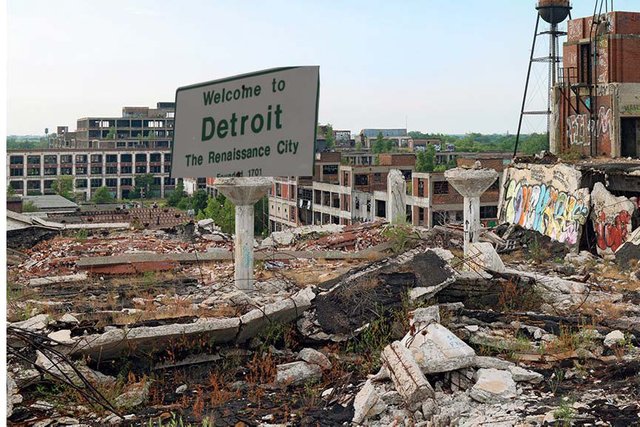The downside of economic growth

Economic growth increases some people’s chances of getting a job or a raise, but it doesn’t mean everything is getting better. Quite the opposite, economic growth isn’t bringing the world closer to Utopia. It’s making life unbearable for the poorest of the poor and bringing the entire human race closer to extinction.
In order to understand why economic growth is so perilous you have to understand what makes the economy rise and fall. Thousands of mind bending books have been written on that subject, and understanding the economy has become more complicated with the invention of the stock market, futures, short sales, trade sanctions, treaties and taxes.
Ultimately, economic growth mainly boils down to how much money people spend, and this concept is easy enough to see with your own eyes. The more customers buy goods and services, the more money businesses have to pay employees, hire new employees, expand/improve their business and ultimately sell more goods and services. The less money people spend, the less money businesses have to invest. If their profits are too low, they’ll eventually have to fire some, or all, of their employees. The more businesses go bankrupt, the more “the workforce” turns into “the unemployed.”
That’s basically common sense, and on the surface it sounds reasonable. The problem lies in how businesses increase profits and what they do with those profits. Business is war, and war is hell. In this economic climate, the most ruthless companies rise to the top, because in order to be the most competitive, they have to underpay employees, gouge customers, lower health standards for workers and customers, eliminate employee benefits, create meaningless and hidden fees, manipulate stock prices, outsource jobs to countries where slavery is less ambiguous, manipulate customer’s minds through disingenuous marketing and exploit tax loop holes and tax havens.
Every blue chip company does this, and they’re just the tip of the iceberg. This is the standard business model for the entire economy. The most successful companies just do it better than anyone else.
The “health” of blue chip stocks is one of the ways we measure the “health” of the American economy, but when companies grow using a slash-and-burn business model, it doesn’t mean life is getting better for most people. It means those companies are bankrupting their less oppressive competitors and creating more jobs in their financially crippling, bureaucratic hell. That’s not taking us closer to a better world. That’s taking us closer to a dystopian novel.
To make matters worse, when the economy is making record-breaking profits, it means businesses are selling an unprecedentedly high number of goods and services. This means our factories and highways are working faster than ever to convert all of the world’s natural resources into consumer garbage destined to become toxic landfills.
If you want to know what the future of the world looks like, go to the island of Oahu in Hawaii. Businesses took the quintessential example of paradise and paved it over with urban sprawl until there wasn’t any room left to build. Now half the beaches are too toxic to swim in, and many have turned into homeless camps that the government bulldozes every few years to keep up appearances.
The cost of buying or renting property in Oahu is astronomical, even in the slums. It takes an hour to drive twenty miles in any direction. Meth use is epidemic among the poor. Brown-skinned workers toil in the tropical heat and humidity harvesting pineapples for barely enough money to survive, while across the island, millionaires get blowjobs from high priced call girls in pent houses. This is not the world you want to live in, but everyday we’re laying more concrete in every direction, solidifying our future in that world.
When the entire world has been converted into strip malls and suburbs, blue chip companies will have secured every human being as guaranteed customers for life, because in suburbia your only access to food, water, clothing, shelter, education and amusement are predatory businesses. When every city looks the same, you can run as far as you want; you’ll still end up somewhere identical to where you started. You’ll still work for the exact same companies and have to buy the same cheap, toxic products.
Even if you like eating at McDonalds and working for Max Lumburg at Initech, you’re still left with the problem that everyone’s employers are converting the world’s natural resources into trash as quickly as possible. I doubt we’ll reach the point where every square inch of usable land in the world is covered in grimy suburban sprawl, because we’ll have burned through our resources before the system has a chance to reach its inevitable end.
If I had to bet money on whether or not suburbia will succeed at consuming the world’s resources to apocalyptic proportions, I would bet that it will, because the more economic growth there is, the more money predatory business owners are able to spend influencing public opinion and government policies. The bigger the marketing industry grows, the more Orwellian our world will become. The more influence companies have over politicians, the more they can design the laws to benefit themselves at the expense of everyone else.
The richest men in the world already have practically unlimited access to political power. So at this point, it’s not about the rich gaining power; they’ve already got it. Now they’re just tightening their grip, and the greater economic inequality grows, and the more time they have to mold the law, the more guaranteed their financial security and growth will be. The more guaranteed “economic growth” is, the more guaranteed the suburbanization, and thus, destruction, of the entire world is.